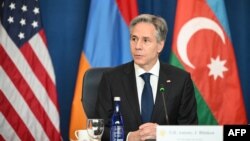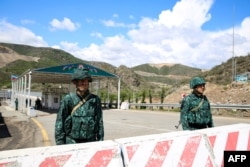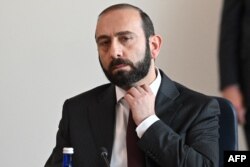Azerbaijan and Armenia made "tangible progress" toward reaching an agreement in Washington-hosted peace talks over the past few days, U.S. Secretary of State Antony Blinken said Thursday afternoon.
The four-day negotiating session did not lead to a peace agreement, but Blinken said he believed a deal was "within sight, within reach."
The talks, which began Sunday, were convened as tensions between the neighboring, former Soviet republics increased in recent months over Azerbaijan's blockade of the Lachin corridor.
The corridor is the only land route giving Armenia direct access to the contested region of Nagorno-Karabakh, where ethnic Armenians are a majority.
"The two sides have discussed some very tough issues over the last few days, and they've made tangible progress on a durable peace agreement," Blinken said at a closing session for negotiation.
He said reaching an agreement would be "not only historic but would be profoundly in the interests of the people of Azerbaijan and Armenia and would have very positive effects even beyond their two countries."
Blinken also said Washington will continue to help both countries reach a final agreement.
Armenian Foreign Minister Ararat Mirzoyan and Azerbaijani Foreign Minister Jeyhun Bayramov, who led their respective delegations, did not speak at the closing ceremony.
The two sides met at a State Department diplomatic facility in Arlington, Virginia.
In a telephone briefing, a senior State Department official, speaking on background, told reporters Monday the United States expected the talks to conclude with "commercial movement of goods" to start soon in the blocked Lachin corridor.
"About Lachin, we have been very clear throughout the last few months about the importance of ensuring the free movement of commercial and humanitarian traffic and people through the Lachin corridor between Armenia and Nagorno-Karabakh. We continue to engage in those discussions," the official said.
Blinken held separate meetings early Monday with the Armenian foreign minister and his Azerbaijani counterpart.
Monday's meetings occurred after Blinken's call with Azerbaijani President Ilham Aliyev on Sunday, when the top U.S. diplomat reiterated Washington's call to reopen the land route "to commercial and private vehicles as soon as possible."
The State Department had voiced "deep concern" that Azerbaijan's establishment of a checkpoint on the Lachin corridor undermines efforts for peace talks.
A representative from Armenia's Ministry of Foreign Affairs said Mirzoyan's working visit to the United States is to discuss "the agreement on normalization of relations" with Azerbaijan.
The two countries have had a decadeslong conflict involving the Nagorno-Karabakh region, which is inside Azerbaijan but populated mainly by ethnic Armenians.
The Lachin corridor allows supplies from Armenia to reach the 120,000 ethnic Armenians in the mountainous enclave and has been policed by Russian peacekeepers since December 2020.
VOA State Department bureau chief Nike Ching contributed to this report.
















